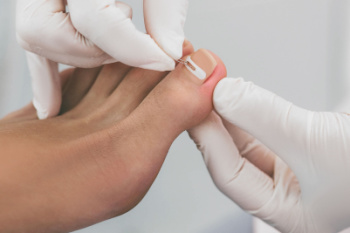Connect With Us
Blog
Causes and Definition of Ingrown Toenails

Ingrown toenails, a common ailment, occur when the edge of a toenail grows into the surrounding skin, leading to discomfort and potential complications. The causes often stem from improper nail trimming, tight footwear, or inherited nail shape, creating an environment conducive to ingrowth. The condition typically manifests as redness, swelling, and pain along the nail's edge. Diagnosis involves a careful examination by a podiatrist who assesses the visual symptoms and inquires about the individual's lifestyle and footwear choices. While mild cases may be managed with warm soaks and proper nail care, severe instances may require medical intervention. Podiatrists may recommend partial nail removal or antibiotics to address infection. An ingrown toenail can cause severe pain and discomfort. If you have developed this condition, it is suggested that you consult a podiatrist who can provide the treatment that is right for you.
Ingrown toenails can become painful if they are not treated properly. For more information about ingrown toenails, contact one of our podiatrists of Greater Boston Foot Care, PLLC. Our doctors can provide the care you need to keep you pain-free and on your feet.
Ingrown Toenails
Ingrown toenails occur when a toenail grows sideways into the bed of the nail, causing pain, swelling, and possibly infection.
Causes
- Bacterial infections
- Improper nail cutting such as cutting it too short or not straight across
- Trauma to the toe, such as stubbing, which causes the nail to grow back irregularly
- Ill-fitting shoes that bunch the toes too close together
- Genetic predisposition
Prevention
Because ingrown toenails are not something found outside of shoe-wearing cultures, going barefoot as often as possible will decrease the likeliness of developing ingrown toenails. Wearing proper fitting shoes and using proper cutting techniques will also help decrease your risk of developing ingrown toenails.
Treatment
Ingrown toenails are a very treatable foot condition. In minor cases, soaking the affected area in salt or antibacterial soaps will not only help with the ingrown nail itself, but also help prevent any infections from occurring. In more severe cases, surgery is an option. In either case, speaking to your podiatrist about this condition will help you get a better understanding of specific treatment options that are right for you.
If you have any questions please feel free to contact our office located in Plymouth, MA . We offer the newest diagnostic and treatment technologies for all your foot and ankle needs.
